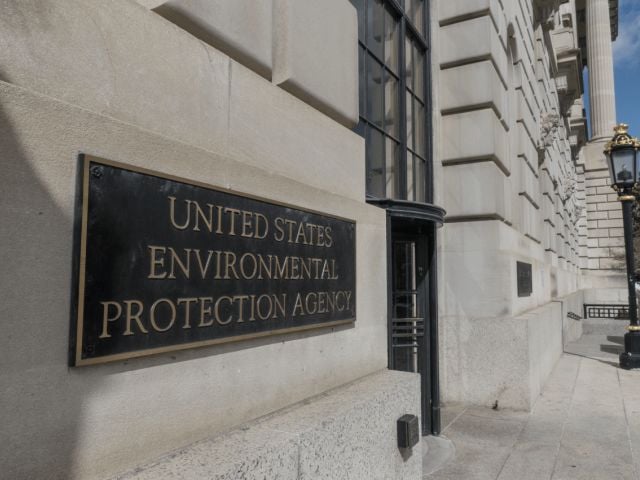Stay up to date with EWG and explore our latest news releases.
Displaying 41 - 60 of 292
Groundbreaking map shows toxic ‘forever chemicals’ in more than 330 wildlife species
Today the Environmental Working Group published an analysis of peer-reviewed data that for the first time shows the global scope of contamination by the “forever chemicals” known as PFAS, which may be...

Delays threaten Biden administration’s promise to tackle ‘forever chemicals’
Federal agencies are failing to meet their own major milestones for taking actions to protect communities from the “forever chemicals” known as PFAS, roughly a year after the White House promised...

EWG: ‘Urgency’ lacking from EPA plan to address ‘forever chemicals’ discharges
Today the Environmental Protection Agency released a plan for regulating wastewater pollution, including discharges of the “forever chemicals” known as PFAS. But the plan doesn’t reflect the urgent...

EWG study: Eating one freshwater fish equals a month of drinking ‘forever chemicals’ water
A new study by Environmental Working Group scientists finds that consumption of just a single serving of freshwater fish per year could be equal to a month of drinking water laced with the “forever...

Updated DOD standards: Critical first step toward firefighting foam made without ‘forever chemicals’
Today the Department of Defense quietly released new requirements for the firefighting foam it uses to put out jet fuel fires. It marks a crucial step toward ending the use of foams containing the...

Groups push agencies to buy only products free from ‘forever chemicals’
A year after President Joe Biden ordered federal agencies to steer their purchasing contracts away from products that contain the “forever chemicals” known as PFAS, a coalition of advocacy groups is...

Global polluter 3M pledges to stop manufacturing toxic ‘forever chemicals’
Today 3M announced that by the end of 2025 it will stop manufacturing the toxic "forever chemicals" known as PFAS and work to discontinue their uses, But it’s too little, too late, because 3M has...

More than 600,000 service members given ‘forever chemicals’ in drinking water
More than 600,000 service members at 116 military installations were annually served water with potentially unsafe levels of the toxic “forever chemicals” known as PFAS, according to an Environmental...

EWG applauds Congress for tackling ‘forever chemicals’ in National Defense Authorization Act
he Environmental Working Group applauds Congress for including several provisions in the National Defense Authorization Act, or NDAA, for fiscal year 2023 to tackle the toxic “forever chemicals” known...

‘Forever chemicals’ polluters could soon face new limits
Thousands of polluters dumping the toxic “forever chemicals” known as PFAS into our waterways could soon face new limits on their releases.

EPA proposal will expand polluter reporting of ‘forever chemical’ discharges
Today the Environmental Protection Agency released a proposed rule removing a loophole that has allowed companies to shirk their obligation to report the toxic forever chemicals known as PFAS under...

House passes bill to protect firefighters from ‘forever chemicals’
The Environmental Working Group applauds the House for passing a bill to help protect firefighters from exposure to the toxic “forever chemicals” known as PFAS widely used in their tools and equipment...

California sues manufacturers like 3M and DuPont over toxic ‘forever chemicals’
On November 10, California Attorney General Rob Bonta filed a lawsuit against chemical companies like 3M and DuPont for endangering public health and harming and destroying the state’s natural...

New tests find toxic “forever chemicals” in pet food bags and baby textiles
The toxic “forever chemicals” known as PFAS have been found in pet food packaging and textile products made for babies and toddlers, according to new Environmental Working Group test results.

Industry once again shirking EPA reporting requirements on ‘forever chemicals’
Just 44 facilities reported discharges of the toxic “forever chemicals’ known as PFAS, despite the existence of almost 30,000 potential dischargers, according to new reporting from the Environmental...

It’s time to designate ‘forever chemicals’ as hazardous substances ‘expeditiously,’ 150 groups say
A letter sent today to the Environmental Protection Agency by 150 environmental, health and justice organizations, including the Environmental Working Group, is pressing for final designation of two...

EWG applauds Maine lawmakers in Congress for helping farmers tackle ‘forever chemicals’
The Environmental Working Group applauds Maine’s congressional delegation for introducing bipartisan bills that would support American farmers whose crops and livestock have been contaminated by the...

EWG updates report card tracking federal agencies’ deadlines for ‘forever chemicals’ actions
The Environmental Working Group today released an update to a comprehensive report card tracking whether federal agencies are meeting deadlines for addressing the health and environmental threats of...

New study finds over 57,000 additional suspected dischargers of toxic ‘forever chemicals’
A new study published today in Environmental Science & Technology Letters identifies at least 57,000 sites potentially contaminated with the toxic “forever chemicals” known as PFAS.

Poll: Nearly all Americans say government must ensure chemicals are safe before use in consumer products
Almost all Americans believe the federal government has a duty to ensure chemicals used in making consumer products are safe, and even more say companies aren’t doing enough to keep toxic substances...
